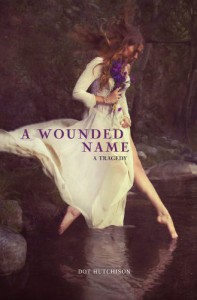A Wounded Name
 The Good
The Good- Hamlet's craziness. I loved that this modern adaptation keeps the manic, desperate feeling you get when reading the original Hamlet. His outrageous antics and his uncanny ability to talk in circles while saying nothing and everything at once were absolutely perfect.
- The tragedy. The way the story slowly spirals forward deeper and deeper into the tragedy also feels very reminiscent to the original play. It is horrifying to stand back and watch the characters slowly do themselves in, but to know exactly how the story will end ahead of time when reading this adaptation made the foreboding and suspense even worse.
The Bad
- Ophelia. I get what this book was trying to do, I really do. Ophelia is the victim--she is abused, pushed around, unseen, unheard. She's only ever needed as a punching bag. Everyone is constantly reminding her of her craziness instead of trying to look past it. This leads her to have very low self-esteem, no self-worth, and a constant burning desire to make everyone around her happy regardless of the cost to her own well-being. I just couldn't get past the fact that this is not a good model to put out for teenage girls, who are the target audience for this adaptation. Hamlet hurts her; he bruises her arms, throws her around, almost chokes her to death, but she sees that as okay because he is mourning his father's death and this is just the way he deals with it. She even acts thankful for the opportunity to be what he needs. She is willing to turn herself completely inside out just to make him happy, and emotionally beats herself up when she is unable to be his venting outlet. It is completely unhealthy. With a different audience, I could see where this would be nothing more than a tragic, powerful portrait of a young girl who his been victimized so much that she has started abusing herself, but it just doesn't work for me when the audience is girls who are Ophelia's age.
- The possessive men. All the men in this story are extremely possessive. Ophelia's father, Hamlet, Claudius--they all stake claim over their women like property. The women are unable to make any of their own decisions, as is ingrained in them from the time they are in school until they choose a husband and marry him. I once again get what the author is trying to do, and I think this modern adaptation of the societal expectations of Shakespeare's time is terribly clever, but I still worry about the message this sends to the teenage audience.
- The pace. This book didn't feel like it really picked up any steam until 75% of the way through. Up until that point, the story serves more as a stage to showcase the characters. The characters in this story are wonderfully developed and do great justice to the original play, but I would have just liked a bit more movement in the actual plot earlier in the story.
Overall Rating
3/5 - Pacing issues aside, this was a pretty wonderful adaptation of the original Shakespearean play. The characters are well developed, the modern twist on the Shakespearean times societal expectations of men and women was clever, I just couldn't get past all the abuse and objectification of women. As an adaptation, this is spot-on, but as a YA book being read by young girls, I think this is not the best idea. Ophelia is a horrible role model and her reactions to Hamlet's abuse are horrifying. I would recommend this book to fans of the original Hamlet, keeping in mind the role Ophelia is supposed to play: she is a victim, and her outlook on life/men is extremely unhealthy.


